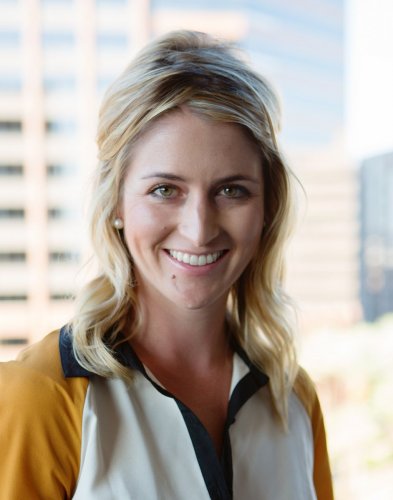#seedSPOTTED an article about our CEO & Founder Courtney in ASU Magazine!
—
ASU alumna and social entrepreneur Courtney Klein.
Courtney Klein believes in moving forward, no matter how challenging the obstacles in one’s path. And quickly. After starting her first nonprofit organization, New Global Citizens, during her senior year of college, and honing her leadership abilities as director of strategic planning and development for the Greater Phoenix Economic Council, she launched SEED SPOT, a nonprofit incubator that focuses on helping social entrepreneurs make their dreams a reality.
SEED SPOT has been featured in Forbes Magazine, Huffington Post, Geek Wire and many Arizona publications. Since opening their doors in 2012, Klein and her team have nurtured Phoenix entrepreneurs with a 12- to 14-week program that involves mentoring, networking, access to a creative workspace and some extra education to give entrepreneurial innovators the tools needed to succeed.
ASU Magazine sat down with Klein recently to discover what makes her such a successful entrepreneur.
You received both your bachelor’s and master’s in nonprofit management, and started your first nonprofit at age 21. When did you know this would be your career?
I actually started at ASU as a broadcast journalism major and had aspirations of becoming Katie Couric and working in New York on national television. After my freshman year in college, I traveled to the Yucatan Peninsula in Mexico and saw first hand how other communities lived, how they dreamed, and how they thrived. It was shocking to be in a community that some would argue had so little, but it was the richest community I had ever been in.
Their dreams, their aspirations and their will to drive change was so inspiring. I started to think that at the age of 19, I had never really witnessed anything like it, and I wondered how many others in the world were unaware of major social problems or felt empowered to create change. So, I changed my major to nonprofit management after that trip and knew I wanted to start an organization to inspire young people (and now adults) to dream and create change in the world.
How has receiving an ASU education affected your choices as a leader and CEO of a nonprofit?
I think being part of such a large university forced me to learn how to network, build meaningful relationships, and navigate through complex systems and structures. ASU prepared me to enter a bigger world.
You were mentioned in Geek Wire as a frontrunner for new hub innovation in the Valley. Tell us about SEED SPOT, and how you envision SEED SPOT contributing to the community now and in the future?
To be honest, SEED SPOT has exceeded many of my expectations in terms of the way the community has rallied to support our work. The number of people that volunteer their time, contribute to our mission, train our entrepreneurs, and advise our alumni is remarkable.
We are more of a community hub, the connective tissue of a broader entrepreneurial ecosystem. Our focus on social impact sets us apart on the national stage as very few incubators really focus on supporting entrepreneurs that are both doing good in the world and making a profit. For us, it leads to working with the most passionate entrepreneurs who are committed to creating positive change in the world.
What has been the biggest challenge you have faced in creating SEED SPOT?
Every day is a challenge, just a different one. The number of opportunities we have far exceeds our staff capacity, so it’s hard to say “no” to opportunities due to bandwidth and funding.
What surprised you most about the skills or tools needed for a successful start-up?
It takes a few things to be an entrepreneur:
An unwavering belief that it is possible.
You cannot have much self-doubt to be successful – you have to be bullish in pursing your mission no matter how hard the path becomes.
The willingness to work the long hours.
There is no such thing as an 8-to-5 in this world. It is hard. It can suck the life out of you. It is addicting in all the right ways and some of the bad ones. Being an entrepreneur is not for the faint of heart or those looking for some cushy gig. The stress is real. You are constantly connecting the pieces, building the relationships, and pushing the boulder up the hill.
No one has the answer except your customer.
Lots of people come up with some fancy idea, an awesome website, some cool technology but after they spend a ton of time and money they realize that no one wanted it or was willing to pay for it. You have to be sure you are solving a problem for people AND that those people are willing to pay for your solution.
Why is the networking and mentoring aspect of SEED SPOT and similar organizations so critical for the success of individual ventures?
It is all about people.
So many entrepreneurs think they just need to raise capital. But if you don’t have customers (people) … you don’t have revenue. If you don’t have a support team (people) … you cannot do it alone. If you want to raise capital … you need relationships with investors (people).
Good entrepreneurs spend their time building relationships with people. Our job at SEED SPOT is to open doors, help entrepreneurs build relationships faster, and teach them how to leverage those relationships to achieve their dreams.
You completed your first Ironman Triathlon in 2013. How do you balance time between training, working at SEED SPOT, and personal time?
That was a journey … the long runs at 4 a.m. were sometimes with board members or peers talking about strategy. The three-hour evening bike rides were often at home on my trainer, with my laptop on the handlebars, cranking away on emails. The miles in the pool gave me time to shut out the world and decompress. Crossing that finish line was emotional for me.
On the other side of life balance, lots of my friends also run organizations or do work in the community, so meeting up after an event or grabbing coffee before a weekend speaking-gig is all part of the routine. Nothing feels like work, so for me, it’s a pretty balanced – and very full – life.
Life is too short to dream small dreams … #dreambig!
How can readers become involved with your organization?
They can order tickets for our upcoming DEMO DAY on May 19. They can join us every Friday at 11 a.m. to hear the leaders of our current ventures practice their pitches at Venture Friday. They can also check out our work in this article that appeared in Forbes and learn more about our High School Program, which works with local high school students to help them identify problems in the world, build real-world solutions, and develop a viable business around it.
~ By Lizzy Ackerman, an intern in the Office of the University Provost.




